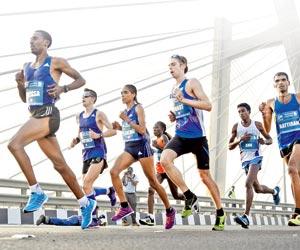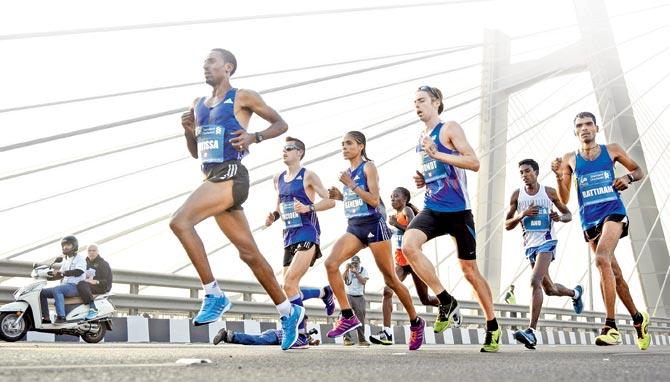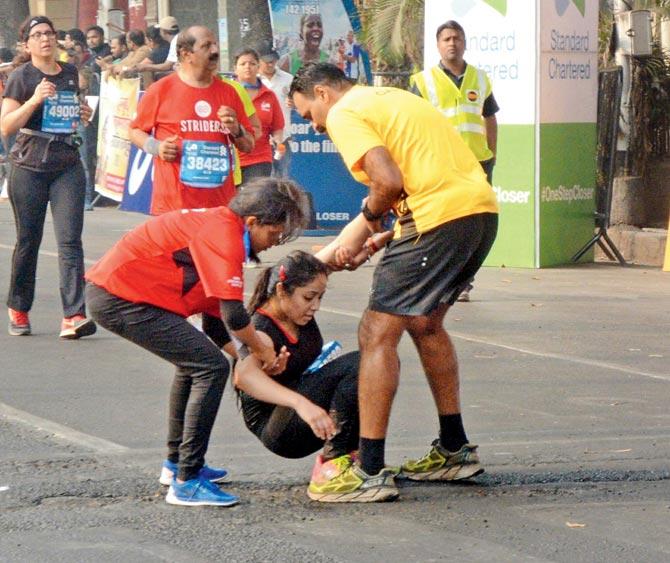Before you wear your running shoes for the upcoming marathon, ensure your body is ready for what it takes to cross the finishing line


Move over, yoga. Running is increasingly capturing the fascination of health-conscious Indians of all ages. The 2004 Mumbai marathon, which was India's first major running event, sparked a boom, spawning nearly 150 running events across the country. Today, India boasts of at least six world-class marathons, which are held in Delhi, Chennai, Kolkata, Bengaluru and Hyderabad, apart from Mumbai. Between 2009 and 2014, the number of marathon runners in India increased by a whopping 154.78 per cent, according to RunRepeat, an international platform for runners.
ADVERTISEMENT

Dr P Gadge and Dr T Upasani
At this point, it is increasingly clear — everyone, from newbies eager to improve their fitness to semi-professional athletes who put in diligent hours of training every week, is either running or wants to run a marathon. Hovering over these promising numbers, however, is a dark cloud of marathon-linked deaths that are widely reported but poorly understood. A study called Cardiac Arrests During Long-Distance Running Races published by The New England Journal of Medicine states the risk of having a heart attack in a marathon as 1.01 per 1,00,000 participants, and the risk of death as 0.63 per 1,00,000 participants. This means, that large marathons can anticipate one heart attack for every 99,000 runners, and one death for every 1,58,000 runners. These numbers can be concerning for runners regardless of their level of experience, since many of these deaths have been linked with otherwise healthy and fit individuals. However, to minimise your risk of marathon-related injury or illness, medical experts recommend that you pay attention to the following guidelines and make an informed decision about your participation.

Suchita Varadkar
Caution is key
Dr Rushikesh Patil, consultant interventional cardiologist at Dr LH Hiranandani Hospital, explains, "Attempting to run a marathon without adequate training can increase your risk of future disease. Endurance events such as marathons have been shown to increase inflammation biomarkers in the bloodstream for prolonged periods of time after participation. A study has shown that untrained individuals can suffer from serious myocardial damage (related to the heart muscle) if they engage in exertion beyond their physical conditioning. Dehydration is another concern for untrained runners, since a lack of training will increase the risk of overheating and heat-strokes, heat injury and rhabdomyolysis — the death of muscle fibres and the release of their contents into the bloodstream. This can lead to serious complications such as renal failure." Ill-trained runners can suffer stress fractures, shin splints and muscular strains, he adds.

Huzefa Lokhandwala
"Running a marathon is akin to playing a high-intensity sport. If you are aiming to run one, you must plan and train like an athlete," says fitness coach Huzefa Lokhandwala. "Do your homework and investigate factors such as the duration of the race, the time, the route and elevations, if any. This will give you a clear image of what you are getting into."

Nikhil Kapoor
Before you begin running or marathon training, diabetologist Dr Pradeep Gadge recommends that you undergo a complete medical check-up by a sports medicine physician or your primary care physician. "Share your marathon training plans with your doctor, and take all necessary tests before you put on your running shoes. Focus on your nutrition, sleep and the right equipment. Be aware that running can expose latent injuries from previous sports activities. If you have any such injuries, discuss these with your doctor. You should also assess and correct your posture as a first step towards training," he advises.
Running mindfully
Dr Tejas Upasani, orthopaedic and joint replacement surgeon, suggests taking it slow when you begin and improving intensity as your body begins to respond to the exercise. "If you can't run, jog or cycle for 30 minutes — which is a baseline to measure your preparedness for marathon running. Begin by running for as much time as you can. Take short breaks when you tire, and then continue. Gradually increase the duration of your runs," he says.
Dr Upasani lists things to bear in mind when you hit the tarmac. For instance, make sure you take very small sips of water while running. Do not combine your runs with weight training at the very outset. Begin with a cardiac exercise regime and couple this with stretching exercises before running and cool-down exercises post your runs. Practise yogic breathing exercises such as kapaalbaati and anilom-vilom, which will help you control your breathing while running and increase your lung power. He adds, "Gradually add calf and thigh muscle-strengthening exercises to your routine. Also focus on strengthening your lower back."

Run like a pro
Veteran marathoner and founder of the Bandra-based running group, Front Runners, Suchita Varadkar shares important guidelines:
> Shoes: Invest in a good pair of running shoes. Consult a physiotherapist to analyse your running gait, and check for muscular imbalances or tightness. Shoes should be half-
an-inch larger than the size you wear, as long-distance running may cause your feet to swell up. Always tie an easy-to-release double knot to avoid tripping, and use the "heel lock" on these shoes to avoid blackened toenails and blisters.
> Wear the right gear: Moisture-wicking apparel is suitable. Apply petroleum jelly to areas where you suffer chaffing due to friction.
> Distance, not pace: Increase the distance of your runs by a maximum of 10 per cent every week.
> Join a running group: This will keep you motivated, and your schedule structured and scientific.
> Stay energised: Eat a fruit before your run, if your training is scheduled for 90 minutes or less. As your durations get longer, you may need a heavier pre-run snack. Proper hydration and electrolytes re-fuelling, before, during and post your runs are important.
> Weekly rest day: This is essential to help your body to recover.

Slow and steady wins the race
Entrepreneur and ironman triathlete, Nikhil Kapoor, explains:
I have been running since I was in college. In 2012, I came across a group of newbie runners who were preparing for a marathon. I decided to join them for a few runs and I gradually became addicted! I have realised that training for a marathon must be structured and scientific, since running can be an injury-prone sport. I suffered my first overuse injury, the IT band or the runner's knee, after I ran my first 24 km upon my friend's urging — my original plan was to run 18 km. As I touched 21 km, I developed pain in my left knee and began to limp. It took me two months to return to running. This taught me the importance of physiotherapy to strengthen my vulnerable muscle groups and to pay more attention to warm-ups and cool-downs. I also suffered from shooting pain in the arches of my feet, which I countered by wearing insoles and doing exercises to strengthen my arch.
Download the new mid-day Android and iOS apps to get updates on all the latest and trending stories on the go
 Subscribe today by clicking the link and stay updated with the latest news!" Click here!
Subscribe today by clicking the link and stay updated with the latest news!" Click here!







